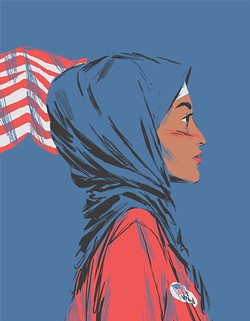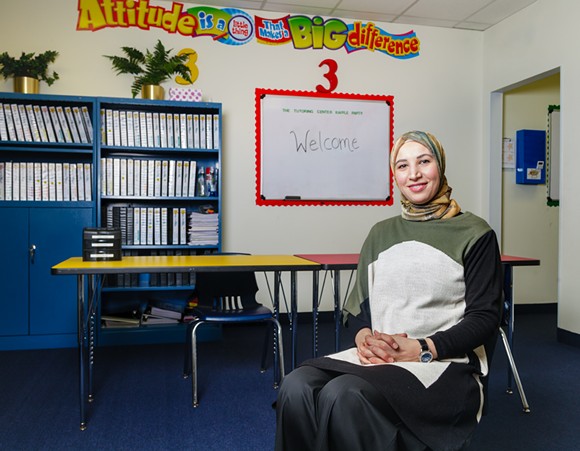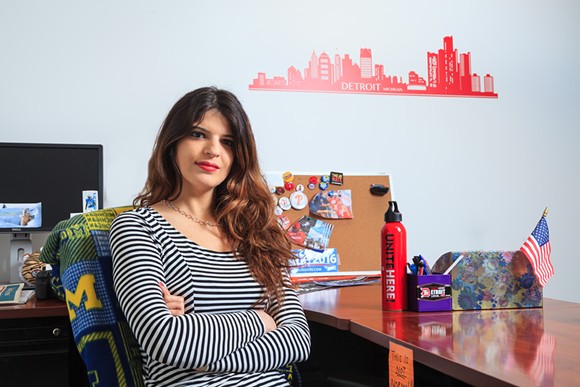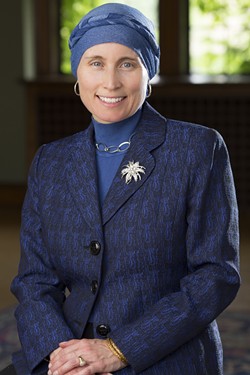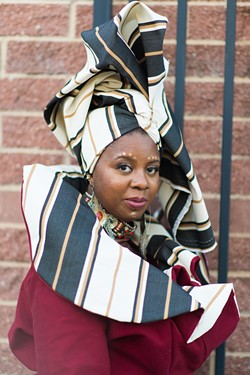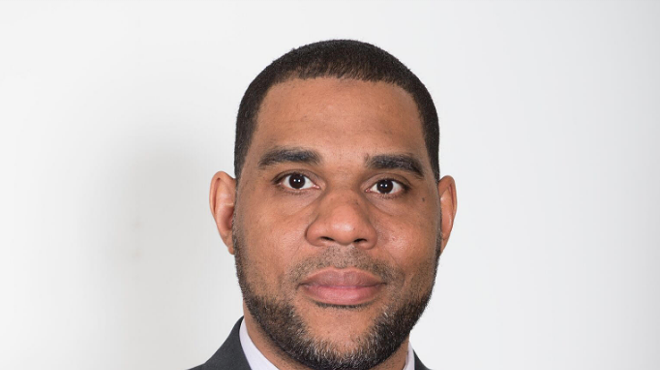Being Muslim in America isn't easy. Should extremists act, the right wing media is quick to question the loyalty of the entire religious group. And now, after being thrust into the spotlight during what seemed to be a never-ending presidential election, Muslims are fully immersed in Trump's America.
According to the Institute for Social Policy and Understanding, a national research institute with offices in Dearborn, Muslims make up 2.75 percent, or approximately 274,000 of our state's population — making Michigan one of the largest Muslim communities in the country. But even here, the election cycle stoked the fires of Islamophobia, with rhetoric that centered on a Muslim registry and immigration bans, which civil rights groups say has led to an uptick in hate crimes and discrimination. Ben Carson, a Detroit native and now a member of President Donald Trump's Cabinet, has even suggested that the United States should not elect a Muslim president — contributing further to an atmosphere of hate.
For Muslim women, few aspects of the religion generate as much controversy and intrigue as the hijab, the headscarf worn by many Muslim women in observance of their faith. Women who wear the hijab dress modestly, exposing only their hands and face in front of men who aren't relatives — fathers, brothers, husbands, uncles, nephews. For the most part, women only wear the hijab when they leave their homes.
The headscarf makes Muslim women easy to spot in a crowd — and easy to target. It also subjects them to stereotyping that characterizes them as oppressed and voiceless. Unsurprisingly, Trump provided key evidence of this stereotype when he suggested Ghazala Khan, the Muslim American mother of a soldier killed in Iraq, hadn't been "allowed" to speak at the Democratic National Convention, as she stood silently and stoically next to her husband as he spoke onstage.
Yet by the thousands, Muslim women challenge this stereotype daily. They are doctors, businesswomen, and stay-at-home moms. They are writers, labor activists, and professionals. They're as varied and complex as their non-Muslim counterparts. And they live here peacefully, proudly serving their metro Detroit communities.

Missa Rajjo is a young mother and business owner. She's also an immigrant, a Muslim, and an observer of the hijab. She came to the United States to pursue the American dream, but last year her sense of belonging was shaken when her identity came under attack.
Rajjo was born in Damascus, Syria. When she was a baby, her family moved to the U.S. to further her father's education. They returned to Syria when Rajjo was 10, but she never really felt like she fit in.
"I was like a fish out of water trying to understand the culture in Syria," Rajjo says. "It took me three years to master the Arabic language and get along with everybody. I missed peanut butter and jelly, my friends, and my life in the U.S."
During her time spent living in Syria, Rajjo began to observe the hijab, but not before resisting the tradition.
"For a long time in my life I refused to wear the hijab," she says. "Although my family was conservative, they never pressured me to wear it. So in my last year of high school I decided I was ready."
More than a decade ago, in pursuit of work, tolerance, diversity, and peanut butter and jelly, she returned to the United States. Like her choice to observe the hijab, it would be permanent.
While Rajjo says she feels like she "belongs," that doesn't mean she hasn't been subjected to stereotyping.
"Nowadays [if you wear a hijab] people look at you and assume you're not educated and not allowed to work or drive," she says. "They assume that when you open your mouth, a heavy accent will come out. Muslim women get that a lot."
Rajjo's resume flies in the face of all that. Furthermore, she doesn't think her hijab has ever gotten in the way of her success.
Now 37 and mother of three, an avid runner, and a Britney Spears fan, Rajjo is an entrepreneur. She owns and operates the Tutoring Center in West Bloomfield ,where she's created award-winning anti-bullying programs.
"When you educate kids, you build a better future for them and the country, and I find that very noble," Rajjo says. "Sometimes, the business takes a big toll on my family, but when my kids grow up, I hope I'll have been a good role model, and taught them you have to go after what you want."
When Trump first announced he was running for president, Rajjo was excited. She saw him as a successful businessman, someone she might be able to learn from. She picked up a copy of his biography and was ready for him to "earn" her vote. In the end, that didn't happen. Her high hopes were dashed when she saw him act like nothing short of a bully.
"Every time he opened his mouth, he said insulting things," Rajjo says. "He didn't do his homework."
Now, she's watching her anti-bullying work unravel on a national stage.
"We are investing so much money into bullying programs and here is a [president] saying the things he's saying and doing the things he's doing and people are cheering," Rajjo says. "And now you're seeing it in schools, like in Royal Oak with kids cheering, 'build the wall.'"
After reading about hate crimes committed against Muslims, she bought pepper spray for the first time. She prays she'll never have to use it.
Disappointed but not defeated, Rajjo still believes in a bright future. She hopes the election was just a "big drama show," and that Trump will be a better communicator focusing on improving education, jobs, and the economy for all Americans in the next four years.
Last year, a car slammed into the storefront of Rajjo's center. Shaken, she was comforted by the Baskin-Robbins owner next door, who happens to be Jewish. "At that moment, I realized he wasn't looking at me as a Muslim woman but as a human," Rajjo says. "I will always appreciate him for that."

Diana Hussein's runs perpendicular to Rajjo's. Hussein, 30, was born to Lebanese immigrants and grew up in Dearborn. She's a die-hard Detroit sports fan, a labor activist, and a Muslim. And she does not observe the hijab.
Growing up in a Muslim enclave, Hussein faced little discrimination other than a bout of middle school bullying over her last name. She says she feels lucky to live in a place where her identity is commonly represented. As she gets older, she's realizing the importance of returning the favor.
"I'm embracing it more because it's important that I represent my community," she says.
But Hussein's take on Islam is less than traditional. She embraces her Muslim heritage as an identity rather than religiously, noting she's a testament to the diversity that exists in the Muslim community.
"I don't pray," she says. "I don't cover. I don't practice daily. Muslims can be progressive or liberal. There's no template for being a Muslim woman. It's more empowering to be able to make those choices."
As a Muslim woman, Hussein is no stranger to stereotypes — or breaking them down. She's a far cry from the hackneyed "Lebanese princess," and she enjoys shocking people with her love and knowledge of professional sports.
"I cry regularly for the Lions," she says. "Whether they win or lose they send me on an emotional rollercoaster. All the Detroit sports teams make me emotional."
When she isn't weeping bitter tears over the Lions, Hussein works as a communications specialist for Unite Here, an international labor union based in Detroit that represents hospitality, hotel, and casino workers. She spent nearly a third of 2016 on a picket line in Atlantic City, where she joined workers protesting at Trump Taj Mahal. And while working on a labor dispute at the Trump International Hotel Las Vegas, Hussein helped build a wall of taco trucks outside the hotel during Trump's stay for a presidential debate.
‘There’s no template for being a Muslim woman.’
tweet this
In December, the Trump International Hotel Las Vegas workers won their contracts, but the victory was bittersweet. Trump had already clinched the presidency.
But the "punch in the gut" election results catalyzed Hussein's resolve to resist. She hopes it will have the same effect on others.
"Responding to his election, there will be dramatic positive changes in leadership and mobilizing people," Hussein says. "People who thought they could sit at home on election night might realize now and think twice about what their role is as citizens."
Hussein worries about her father, who works as a taxi driver in Detroit and has been harassed on several occasions, given the climate of hatred toward and suspicion of Muslims heightened by Trump's election.
"There's too much tension in this country," she says. "It's the way he's divided people, and how he attacked the Muslim community and other communities."
But Hussein has hope and she recognizes that most Americans don't share Trump's views. She believes those who voted for him did so despite his derogatory comments about Muslims, Latinos, and African-Americans.
"A good portion of people who voted for him are getting a bad rap," she says. "There are a lot of people in this country that aren't fazed by what he's saying about immigrants or people of color. To them their identity is based on their jobs in the factory, and Trump spoke to them."

Based on her union experience, she believes the working-class Trump voter will be let down. "At the end of the day, the issues that working-class people struggle with relate to all people," Hussein says. "How to get your kids in college, how to put food on the table — those are issues that affect everyone." Jacqueline El-Sayed can relate to working-class people and their struggles. She's driven big rigs after all. But you'd be remiss to define her as a truck driver. She has a doctorate's degree in mechanical and aerospace engineering, she's a professor, a school board member, and a college administrator. She's worn many hats during her professional career, and a hijab through it all
El-Sayed began her career at General Motors as a truck engineer, where she remembers generally being the only woman at the plant.
Her experience at GM along with her doctorate's brought her back to her alma mater, Flint's Kettering University. In 2004, after securing tenure and being elected Kettering's faculty leader, she received a phone call from then-Gov. Jennifer Granholm's appointment office. Granholm was looking for qualified people to appoint to the Michigan Truck Safety Commission. El-Sayed applied the next day and got the position.
After being elected the chair of the commission a year later, El-Sayed made a discovery that would affect Michigan drivers for years to come.
"I was analyzing statistics and in the majority of fatal accidents in Michigan it was the behavior of the passenger cars that caused the accidents," El-Sayed says. "But the commission was spending all its money on educating the truck drivers."
She approached then-Secretary of State Terri Lynn Land with her recommendations. "I went to talk to her and tell her we are putting our money into the truck drivers, but if we want to save lives, we need to educate passenger car drivers," El-Sayed says. "I told her, 'I'm an educator and understand traffic safety, and I'd be happy to help you.'"
Land appointed her to the state's Driver's Education Advisory Committee, where she played an instrumental role in drafting the Drivers Education Providers Act of 2006.
El-Sayed has spent most of her life working in male-dominated fields and climbing up into leadership positions while maintaining her teaching career. She is now vice president for academic affairs at Marygrove College in Detroit.
El-Sayed is a living, breathing contradiction of the stereotypical voiceless Muslim woman.
She says she's only experienced bias from people who don't know her or her credentials. "They'll slow down their speaking because they'll think you don't know English, but you get over it quickly because you have work to do," she says.
For El-Sayed, the hijab is a symbol of her religion and she's proud to wear it. It's her faith, she says, that deepens her connection to the world and to a "long line of believers" of Jews, Christians, Muslims, and other faithful throughout the world.
‘We have people who have never really met a Muslim or have so few people of color in their communities. People are afraid of what they don’t know.’
tweet this
But El-Sayed is concerned about the divisiveness she's seen emerge as a result of the presidential election. She was concerned to run for re-election to the Bloomfield Hills School Board in 2016 because of all the "rhetoric and negativity" in the country. She's concerned for her children and for society.
Born in Lansing, she knows what it's like to come "from a place similar to Up North," where residents don't have access to people of different colors, different ethnicities, and different religions.
"We have people who have never really met a Muslim or have so few people of color in their communities," she says. "People are afraid of what they don't know. So it's easier for people who are willing to use that discomfort to marginalize people and cause rifts between groups."
El-Sayed is a champion of diversity at Bloomfield Hills Schools and works to create partnerships with the community to improve academics and cultural competency for her students. "My calling in life is being an educator," she says. "It gives me hope that I can be a part of this good work and that through this good work we can be a lighthouse."
She notes that students at Marygrove, 80 percent of whom are people of color, held interfaith prayer vigils before and after the election. She's proud of her school district and the inclusivity of the Bloomfield area, and attributes much of it to the strong interfaith community at work in metro Bloomfield and Detroit areas.

"All of us are in this together," she says. "It's scary for all of us. We try to look at how we can take action to make things better." Zarinah El-Amin Naeem is also an educator, but her work is much different than El-Sayed's. The Detroit native and mother of three has spent her life bringing people of different faiths and cultures together through the hijab.
During her junior year of college, after watching some Muslim classmates she admired on campus, El-Amin Naeem decided she too wanted to be visibly Muslim. "Within the African-American community, covering your hair every day signals to other people that you're on a spiritual train, even though it's a head-wrap style and not a drape look," she says.
El-Amin Naeem shocked friends and family when she turned down a well-paying job in computer science after graduating from Howard University. Instead, she wanted to make an impact through community building and humanitarian work.
Her position as African program coordinator for Life for Relief and Development, a U.S.-based humanitarian organization, took her to Sierra Leone. Outside her office, she noticed two young girls selling oranges every day. El-Amin Naeem wondered why they weren't in school. After asking around, she discovered the girls were working to support their families and didn't have the money to go to school. She offered to sponsor the girls' education and their parents agreed.
After leaving her position in Africa and coming back to Michigan, she continued supporting the girls' education. So in 2011, she created Beautifully Wrapped, a calendar featuring images of people from different faiths and cultures donning head wraps. The proceeds went to support the African Girls Scholarship Fund she created.
Since its inception, Beautifully Wrapped has grown to include an annual head-wrap expo, exhibits, and workshops.
"Head wrapping is one of those multicultural global phenomena that's found in a lot of different cultures," she says. "I am big about intentionally creating cultural empathy and understanding, and exploring the intersection between fashion and faith is how I do that."
The expo is held in Dearborn, and draws nearly 900 participants annually. The event pulls together Muslims, Orthodox Jews, Orthodox Christians, Bulgarians, and other groups with a history of head wrapping. They explore head wrapping's history through fashion shows, workshops, and interfaith panel discussions.
In November, Detroit's Knight Art Challenge awarded Beautifully Wrapped a $45,000 grant, which will be used to expand its head-wrap expo into a national and international traveling exhibit.
El-Amin Naeem says her faith has played an integral role in her humanitarian work and in the way she lives her life and serves others. "Spiritually praying every day throughout the day helps me refocus my attention on what's important," she says.
After dedicating her life's work toward building community and understanding, El-Amin Naeem says the election hasn't affected her much. She didn't feel fear after the elections like many other Muslims because she avoided television coverage and followed the election on NPR and Facebook.
"I don't understand why people were shocked that people would vote for Trump," El-Amin Naeem says. "People are always concerned about their pockets and dollars. If they see someone who will preserve their bottom line ... they will vote for that person."
El-Amin Naeem hopes that the "type of election" and the "type of result" our nation had will motivate people to get more active in their communities.
"I have to stay focused on what I'm trying to do, which is to build cultural love, and my projects aren't going to stop doing that," she says. "I do have to empathize with others who are having real fear, but for me I don't have the same reactions that many Muslims have."
What the hijab means to these women depends on which one you ask. To some, the hijab is a submission to a request from God. To others the hijab is also a protection from — and a rejection of — society's ever-growing sexualization of women. But what the hijab is definitely not to these women is oppression or victimization.
Against a growing political movement to cast Muslims as un-American or part of "the other," slowly but surely, Muslim women are becoming a familiar sight in mainstream American culture.
During the 2016 Summer Olympics, Ibtihaj Muhammad became the first American Muslim woman to compete wearing the hijab. Her team brought home the bronze. In Minneapolis, Ilhan Omar, who came to the United States as a refugee, became the first Somali-American-Muslim elected as a state representative. CoverGirl recently signed its first hijabi ambassador, Nura Afia, and during New York Fashion Week, Anniesa Hasibuan became the first designer to cast all her looks outfitted with hijab. And in Dearborn, Amal Chammout became the first uniformed police officer to serve with the hijab in the United States.
To many Americans, these women are shattering stereotypes, but millions of Muslim Americans are praying their daughters will not have to "shatter stereotypes" or "break boundaries" when they grow up. Hopefully, they won't be around anymore.

